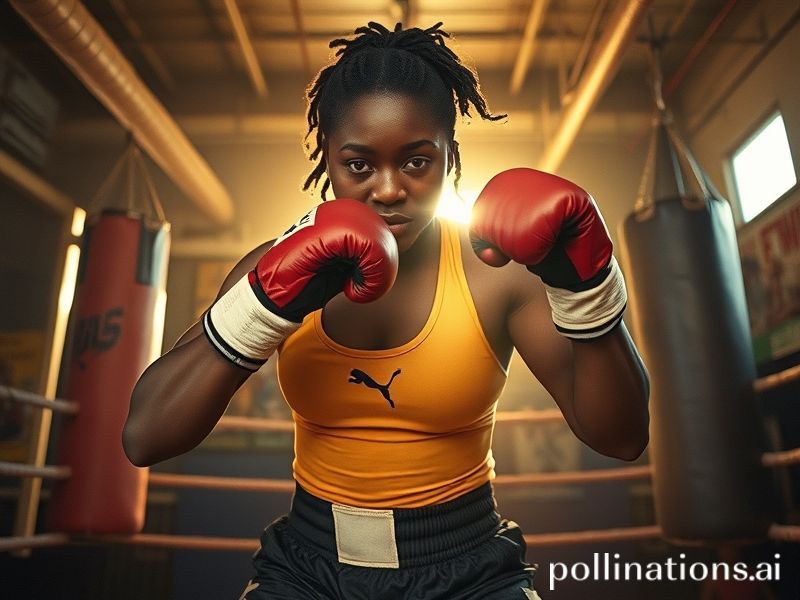Claressa Shields: How a Flint Fighter Became the World’s Most Dangerous Diplomatic Weapon
Claressa Shields Is Still Punching Gravity in the Face, and the Rest of Us Are Just Catching Up
By the time Claressa Shields stepped off the plane in Riyadh last October—yes, the same desert megacity that now hosts heavyweight pageants between YouTubers and pensioners—she had already rewritten the atlas. Flint, Michigan, population 80,000 and falling faster than its water quality, had managed to export the most indestructible woman on the planet. The Saudis, ever subtle in their sportswashing, draped her in gold-trimmed robes like a prizefighting Fabergé egg. She smiled, bowed, and presumably wondered whether the local commission would let her hit someone twice for the same paycheck.
Globally, this was more than another boxing card. It was geopolitical slapstick: an American woman raised on food-stamp calculus headlining in a kingdom that only began allowing women to drive during her third pro fight. Somewhere in the Kremlin, a bureaucrat updated the “Soft-Power Obstacles” spreadsheet; in Beijing, a sports-ministry intern Googled “Shields training regimen” in Mandarin. Even the BBC—which still files combat sports under “Other” next to darts and cheese-rolling—led the bulletin with her face. The takeaway: if you can jab capitalism, patriarchy, and regional misogyny in the same round, CNN International will happily hand you the mic.
But the real punchline is economic. Women’s boxing has historically paid less than the paper the contracts are printed on, yet Shields has forced purses into seven-figure airspace. Promoters in Dubai, London, and Lagos now calculate gate receipts with a new variable: “C-Shields coefficient.” Translation: How many extra zeros do we add when the headliner can both sell tickets and hospitalize the runner-up? The answer is reshaping talent pipelines from Soweto gyms to Siberian barns. Suddenly, little girls who once heard “boxing is for boys” are being nudged toward punching bags instead of bridal magazines. Somewhere, a marketing executive at Nike is drawing a Venn diagram labeled “rage” and “retail.”
Ironically, the sport that tried to sideline her is now her loudest megaphone. Rankings bodies—those cartels of cigar smoke and self-importance—have invented belts the way TikTok mints influencers. Shields already owns four of them at middleweight and is eyeing a fifth at super-welterweight, because why collect stamps when you can collect scalps? Meanwhile, the International Olympic Committee, still nursing its hangover from Tokyo’s cardboard beds, quietly hopes she’ll return for Paris 2024. Ratings gold, after all, outweighs moral consistency.
And yet, the woman who calls herself “T-Rex” remains Flint’s most reliable export, right behind existential dread. She still trains above a converted auto shop, where the heating works only when the fighters swear creatively enough. Ask her about global fame and she’ll quote the water bill. Ask her about legacy and she’ll mention the niece who thinks every auntie is supposed to have two Olympic golds and a perfect pro record. Perspective: it’s harder to dodge than a right uppercut.
The broader significance? Shields is proof that the 21st-century superpower isn’t a country—it’s a narrative. If you can sell the story of beating the odds faster than the odds can reload, borders become suggestions. Governments court you, brands adopt you, and dictatorships rent you by the evening. Meanwhile, ordinary mortals scroll Instagram and wonder why their own morning jog feels like surrender. The answer, of course, is that we skipped the part where we punch fate in the teeth before breakfast.
So as she eyes undisputed glory in a third weight class—possibly on a floating casino moored off Monte Carlo, because boxing loves a metaphor—remember this: Claressa Shields isn’t just winning fights. She’s stress-testing the idea that gravity, poverty, and patriarchy are immutable laws. So far, gravity is losing on all scorecards.
The rest of us remain upright, barely, awaiting the next bell.







